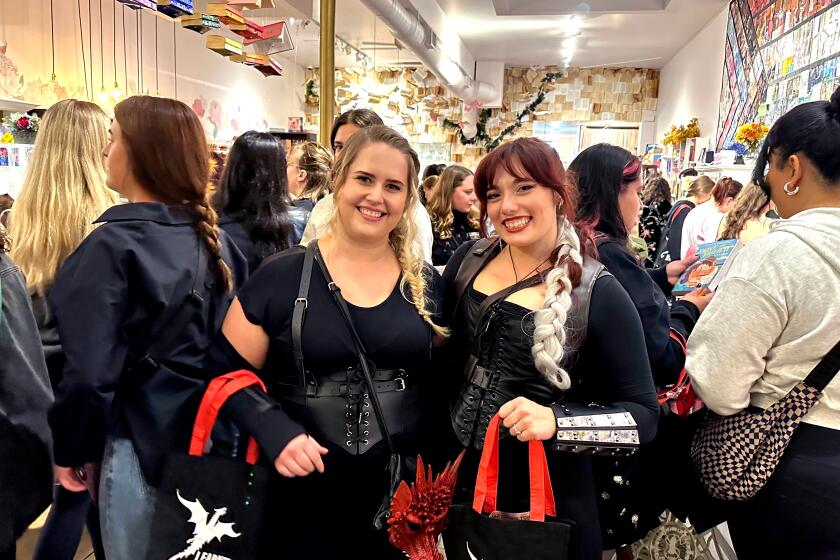Growing Up in Tinseltown Creates Fiction on the Fringe : Author: Craig Nova left Hollywood’s dark danger for the lush greenery of Vermont. But L.A. kept gnawing away at him.
- Share via
PUTNEY, Vt. — This could be among the last places in America where a shopper can find a fine selection of dresses made from Indian bedspreads. The general store sells sun-dried tomato pesto. At the food co-op, humans pay handsomely for designer water. Dogs get it for free, in nice big buckets.
With pottery studios on every corner, a thriving psychotherapy practice in the center of town and--down the highway a few miles--a gas station that dispenses psychic readings, the area feels like Hollywood’s vision of a 1968 time warp. It feels like something off the back lot at Universal Studios. (“Cue the hippie village!”) It feels equally like a place that--if it didn’t exist--Craig Nova might have invented.
In truth, this hamlet in the southern tip of America’s most rural state is where Nova, who grew up with the Universal back lot practically in his back yard, has chosen to settle. As a kid, Nova looked out from his house on Bennett Drive and watched “Spartacus” being filmed. As a pushing-50 novelist, Nova looks out from his writing room and sees trees, trees and even more trees. It is a source of continual marvel that everything is green here, even the license plates.
“There was something about growing up in California,” Nova said. He was sipping hot, strong tea in a house built by a 19th-Century shipbuilder who decided he had had enough of the sea.
“I took it as absolutely normal, not bizarre or unusual,” reflected Nova, whose Hollywood High classmates included most of the Mouseketeers. “However, when I got to the East, it did dawn on me that a large portion of humanity did not grow up with the same set of expectations and assumptions.”
Recently, visiting his sister, Nova was reminded anew of that discrepancy. His sister raises horses in Santa Ynez, and with absolutely no attempt to hide her disgust, she informed her brother that he had turned into an Easterner. It might have been his clothes, rumpled khakis and the kind of light blue button-down shirt that prep school boys lived in a generation ago. It may have been his speech, mannered and sometimes stiff--hardly the argot, in any event, of someone who used to race Steve McQueen on Mulholland Drive.
“When I was out there, I was trying to put my fingers on the precise nature of the psychic or spiritual discomfort,” Nova said. “And it seems to me that it is the disparity between what that part of the world promises and what it delivers.”
For years, ever since he finished up at Berkeley and headed back to Columbia for grad school, California has gnawed at Nova. Decades of shoving such ruminations to the back of his brain finally resulted in “The Book of Dreams” (Ticknor & Fields, 1994), a novel set in contemporary L.A., but filled with the dark sense of danger that Nova said he inhaled just growing up there.
“I think this book has been working its way through my system,” he said of the book that waited 25 years to be written. What emerged was the intertwining story of three central characters, each living in a separate state of reverie and anticipation. Things will get better, each one of these characters just has to keep believing. The golden dream will come true.
“I think what this book is really about is people trying to come to terms with the promise of what they might be,” Nova said. “Everybody has dreams of making that big killing, getting away from what they’ve got.”
And in this book, as in life, Nova believes, “Everybody has a pretty definite set of desires. Love, money, land. That seems to be it.”
Hollywood was a company town when he was growing up, Nova recalled. His own family was not in “the Industry”--his father worked in aerospace--but Nova hung with the film crowd, because that was what was around him. He said that once, as a teen-age gang member, he sneaked onto a studio back lot at night. In a bizarre chase scene, the police pursued him through the dusty streets of an imitation Wild West town.
But it was always the rough edges that fascinated him the most. When he turned to fiction, the friction at the fringe became a persistent theme.
“It always seemed to me as a writer that the best way to portray what somebody is all about is to put them in circumstances where they are under a lot of pressure,” Nova said. The seven novels that preceded “The Book of Dreams” all emphasize the quiet tension between risk and respectability, “a kind of suction,” Nova calls it in this latest work.
“It’s the pressure that reveals who people really are,” Nova said. “Stories work much better.”
Nova has had some experience with this sense of urgency himself. Years ago, he won a fiction-writing grant from New York state. It turned out to be the kind of award that had to be repaid with services, and no sooner had Nova used up the money but the state turned up, reminding him that it was pay-back time.
“Put me in someplace where no one else wants to go,” Nova said, feeling brave, cavalier and maybe a little bit crazy at the time. He figured they’d send him to Queens. Instead they dispatched him to Sing Sing, where his first group of students were all convicted killers.
Prison guards are a singular lot, Nova discovered. Most of them are not particularly fond of their charges. Writers, Nova found, do not rank much higher.
“The guards’ attitude was, ‘well, if you get into any trouble with these guys, don’t expect us to do anything,’ ” Nova said. Luckily, he stayed out of trouble.
In New York Nova married Christina Barnes, who trained at MIT as a city planner but went to work at CBS News instead. Barnes’ career advanced steadily. But as the pair reached their early 30s, they decided it was time to have children--and New York was not the place to do it.
They worked their way north, stopping when they happened upon this “idyllic” pocket of countryside. With their two daughters, Abby and Tate, they share a calm and measured existence that makes writer friends in New York slobber with envy.
“We count our blessings about this all the time,” Nova said. “That is not to say that there are not times when it’s exceedingly scary”--such as when unreconciled bank statements show up.
Every day, Nova sculls on the Vermont River. And every day he writes, already deep into the next novel--medically themed, since health these days is a fairly risky preoccupation.
Even in the halcyon isolation of Vermont, his readers are never far from his thoughts, Nova said.
“You have to realize that someone goes out and puts down the $21 to buy your book,” he said. “So it’s a job.
“That’s not to say that you write unmitigated junk, but it is a job. It’s work. If you’re not worried about your audience, people are going to be alienated. The most important person in writing a book is the reader, not the writer.”
More to Read
Sign up for our Book Club newsletter
Get the latest news, events and more from the Los Angeles Times Book Club, and help us get L.A. reading and talking.
You may occasionally receive promotional content from the Los Angeles Times.








